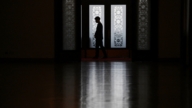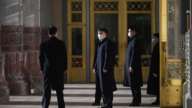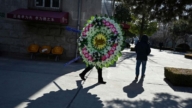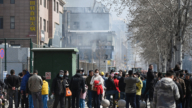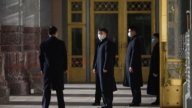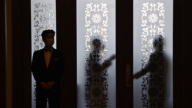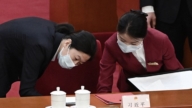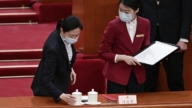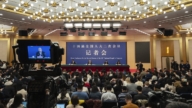【新唐人2013年03月23日訊】今年中共「兩會」各級官員的高「反對票」和「棄權票」,歷屆少有。而政府的多份工作報告,更是創下「反對」的歷史記錄。事實上,這還是中共擔心,準新「上任」領導人得票太低,事先在「高級選民」中,進行秘密預選後的結果。請看報導。
據香港《爭鳴》雜誌透露,中國新年前夕,中共政治局就對三月初新一屆人大、政協「兩會」進行工作部署,其中一項就是,就新一屆準人大委員長張德江、準國務院總理李克強、準國務院副總理人選,和準全國政協主席俞正聲等,進行內部摸底。
有關預選工作是在保密情況下展開,時間從1月28號到2月2號。
有資格充任「高級選民」的高官包括:中央委員、候補中央委員、中紀委員共471人﹔省部一級黨委(組)成員498人;全國人大常委、省級人大主任、副主任361人;全國政協常委、省級政協主席、副主席及各民主黨派中央成員515人;省級政府省(市)長、副省(市)長181人,共計2026人。
文章披露,在預選投票結果出來後,中共政治局常委及中央政治局對「反對」和「棄權」之高,感到震驚和焦慮。
文章感歎:準領導人在中共最高層內部得到這樣的得票率,「實乃天下奇聞」。
而在「兩會」的實際選舉中,有一些官員的得票率仍不理想:環境保護部長周生賢獲得了171張反對票和47張棄權票;住房和城鄉建設部長姜偉新則有181張反對票和36張棄權票;而人大常委委員朱國萍更是獲得了986張反對票,296張棄權票。其他像教育部長、央行行長反對票也都是過百。
獨立評論員邢天行:「保密預選實際上就是怕露醜。因為在以前的時候,歷次選舉當中,沒有像這次兩會期間發生這麼大量的棄權、反對這樣的票,一般都是同意,所以,他們沒有想到會這樣,給大家一定的公開,選票出來之後,成為大家笑話的對像了。」
邢天行指出,中共又想維持專制體制,又想裝民主,看來是不成功。
唯一連任十二屆人大代表的申紀蘭,被稱為「人代活化石」。早在2010年,申紀蘭就表示:當代表就是要聽黨的話,她從來沒有投過反對票。申紀蘭的其他語言也很雷人,她說:「我們是民主選舉,我不跟選民交流」。
時事評論員蘭述認為,中共的選舉,實際就是各個利益集團瓜分國家權利的過程,所謂的「兩會」,是用國家法律的形式,讓中共內部各個利益集團代理人的權利合法化,所以要保證代理人都當選。
時事評論員蘭述:「黨內有一個非常重要的利益集團沒有得到它所得到的利益,那麼將來的執政是有危機的。所以當他得票太低的時候,其他的幾個派系還要去幫忙給他投票,讓他通過的。只有這樣做,才能達到黨內各個派系的利益均衡。」
不過,還是有人對這次的人大選舉提出了質疑。
日前,浙江杭州律師王成,向最高法院寄發一份起訴狀,要求確認「張德江、王勝俊等人當選人大正、副委員長,因違反《憲法》中第65和103條而無效。」
而,這次「兩會」多份政府報告的表決結果更令人意外:最高人民法院的工作報告反對票高達605張,棄權票120張;最高人民檢察院的工作報告也有485張反對票,棄權票121張;而中央及地方政府預算草案有509票反對,127票棄權。反對票數量和比例,都創下近年來的最高記錄。
採訪/陳漢 編輯/宋風 後製/鍾元
High Records of Against and Abstentions
In 2013, the Chinese Communist Party (CCP) officials at
all levels, during the two sessions,
had an unprecedented high volume of
against and abstention, votes.
Multiple government work reports have set new
historical records of against.
However, because the CCP feared the
prospective leaders won too few votes,
it had already done a secret pre-selection among
‘senior voters’ in advance. Let’s see the reports.
According to Hong Kong’s Cheng Ming magazine,
before the Chinese New Year,
the CCP Politburo had started arrangements for the
new session of the National People’s Congress, NPC,
and the two sessions of CPPCC in early March.
One task was to thoroughly investigate Zhang Dejiang,
quasi-chairman of NPC, quasi-Premier Li Keqiang,
the quasi-vice prime minister and Yu Zhengsheng,
the quasi-chairman of the CPPCC, internally.
The pre-selection was done in secret from
January 28th to February 2nd.
Qualified ‘senior voters’ include 471 members and
alternate members of the Central Committee and the Central Commission for Discipline Inspection;
498 provincial and ministerial-level
party committees (group) members;
361 members of Standing Committee of the NPC,
the provincial NPC directors and deputy directors;
515 standing committee members of the CPPCC,
the provincial CPPCC chairmen and deputy Chairmen,
and members of central committees of democratic parties;
181 provincial governors and deputy governors,
mayors and vice mayors. It is in total 2,026 people.
The article revealed that after the pre-selection voting
results came out, the CCP Politburo Standing Committee and
the Political Bureau of the Central Committee were shocked
and worried about the high volume of against and abstention votes.
The article lamented that the quasi-leaders at the highest
level of the CCP had so few votes, “It’s mind blowing.”
In the real election of the two sessions,
some officials’ votes were still not enough.
Zhou Shengxian, Environmental Protection Minister,
had 171 against and 47 abstentions;
Jiang Weixin, Minister of Housing and Urban and
Rural Construction had 181 against and 36 abstentions;
Zhu Guoping, member of Standing Committee of
NPC had 986 against 296 abstentions.
Minister of Education, the central bank governor
also had over 100 against votes each.
Independent commentator Xing Tianxing: “Confidential pre-
selection is actually being afraid of being embarrassed in public.
In previous elections, there were no such
high levels of against and abstentions.
They were generally agreed. They did not think once of
giving any publicity, the results were a joke.”
Xing Tianxing pointed out the CCP wants to maintain its
authoritarian regime, and pretends to have democracy, which appears to be unsuccessful.
The only consecutive NPC representative is Shen Jilan,
known as the living fossil to generations of humanity.
As early as in 2010, Shen Jilan said to be a representative
is to listen to the CCP, and she had never casted against vote.
Shen Jilan’s other comments were also very shocking,
she said: “We are democratically elected, so I did not communicate with voters.”
Political commentator Lan Shu said that the CCP election is
actually various self-interest groups carveing up national interests.
The so-called two sessions, uses the form of national law
to legalize the rights of the agents of various interest groups,
so they had to ensure their agents are elected.
Lan Shu: “If there is any important interest group
within the CCP that does not get elected,
then the future ruling is in a crisis. So when votes are too low,
the other several factions also lend a hand and vote for it,
and let him pass. Only in this way can it achieve the balance
of interests among various factions of the CCP."
However, people still questioned the election of the NPC.
Recently, Wang Cheng, an attorney in Hangzhou, Zhejiang
Province, sent to the Supreme Court a bill of complaint,
and asked for confirmation that “Zhang Dejiang,
Wang Shengjun, and other people being elected to the NPC
chairman and vice chairmanship are invalid because of
violation of the Constitution, Article 65 and 103.”
The government reports of the two sessions’
voting results are more surprising.
The work report of the Supreme People’s Court
had up to 605 against votes and 120 abstentions;
the work report of the Supreme People’s Procurator
had 485 against and 121 abstentions;
draft budget of the central and local governments
had 509 against and 127 abstentions.
Against votes number and proportion
are the highest on record in recent years.


